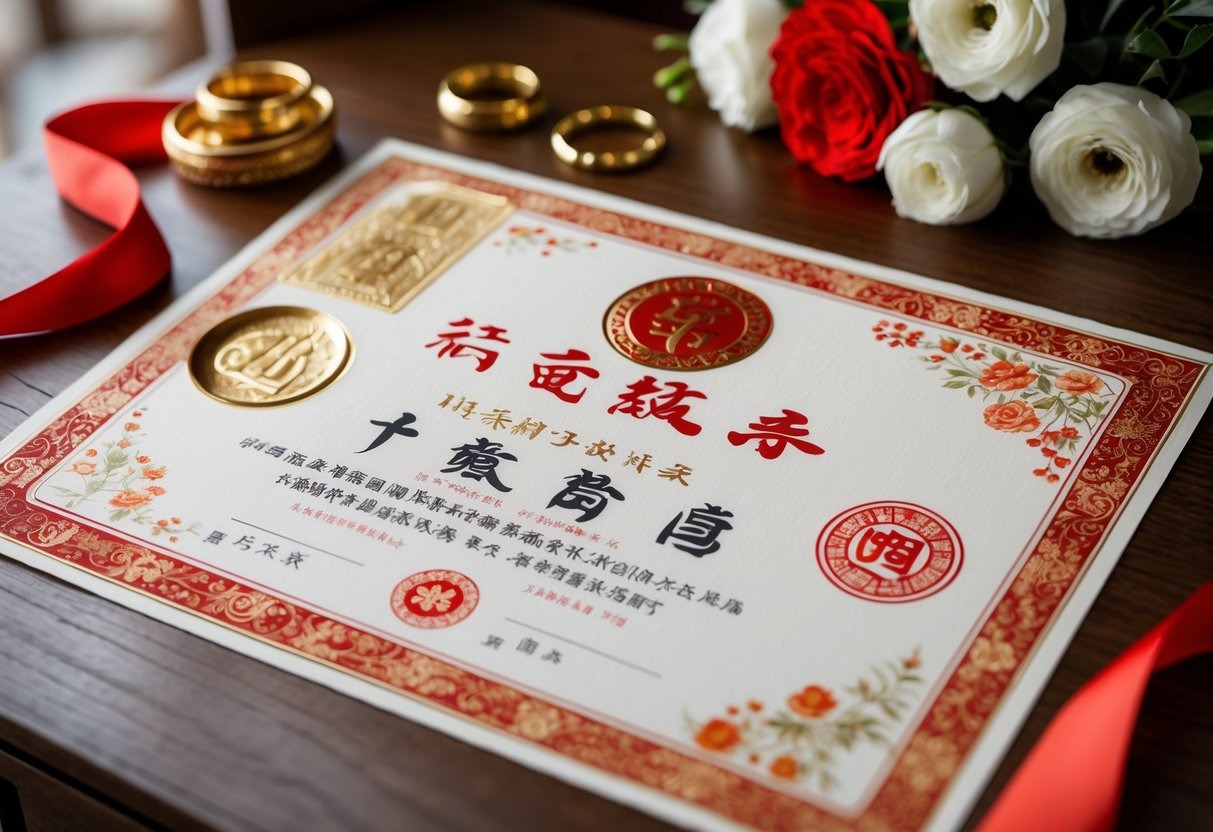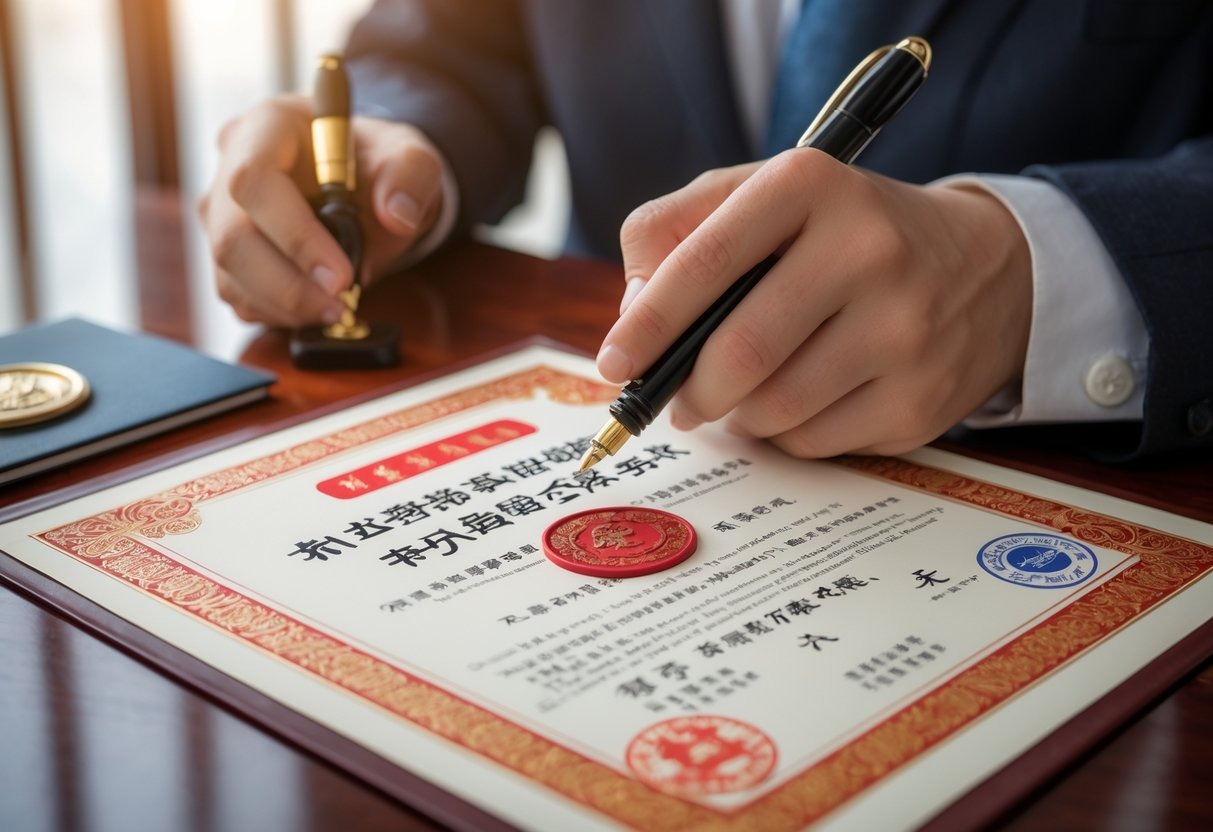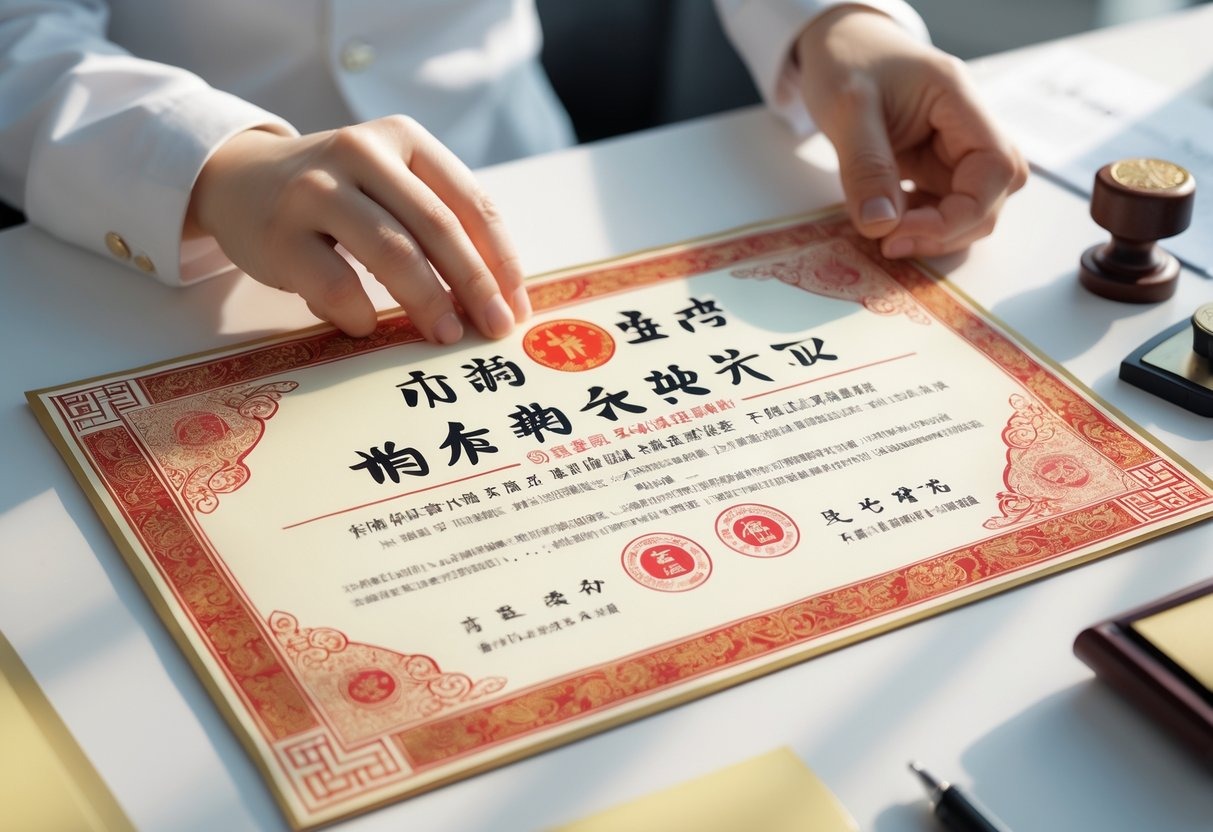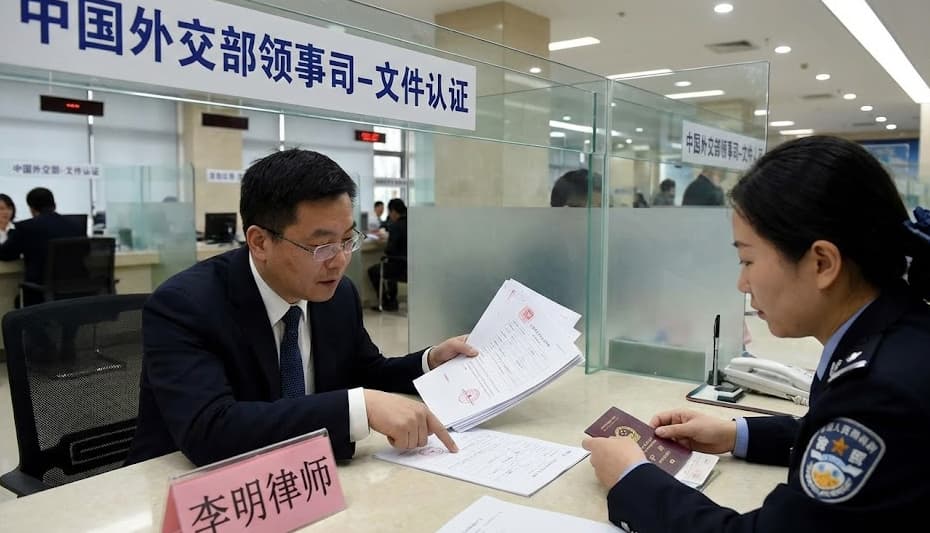Getting married in China means more than just a ceremony—it’s about getting legal recognition with an official marriage certificate. This little red booklet, handed out by the local Civil Affairs Bureau, proves your marriage is valid under Chinese law.
A Chinese marriage certificate is the only legal proof of marriage in China, and you’ll need it for anything official or international.
You’ll have to meet certain requirements and bring the right documents before you can register. If one of you isn’t Chinese, you’ll need extra steps like notarization or translation so the certificate works overseas.
Figuring out these details saves you time and hassle, and makes sure your marriage counts both in China and abroad.
Key Takeaways
- The Chinese marriage certificate is the legal proof of marriage in China.
- Registration means meeting official rules and handing in the right documents.
- Notarization and translation make the certificate work for international use.
Understanding the Chinese Marriage Certificate

The Chinese Marriage Certificate is the official record of a legal marriage under Chinese law. You’ll need it for a bunch of things—civil, legal, and immigration stuff—both inside and outside China.
What Is a Chinese Marriage Certificate
A Chinese Marriage Certificate (中华人民共和国结婚证) is a red booklet from the Civil Affairs Bureau (民政局). It proves your marriage got registered with the Marriage Registration Authority of China.
Each spouse gets their own booklet. Inside, you’ll see names, ID numbers, photos, and the date you registered. There’s also the official seal from the office.
Chinese citizens usually register at the marriage registration office in the area tied to their hukou (household registration). If you’re a foreigner marrying a Chinese citizen, you’ll need a valid passport, proof you’re single, and other documents before you can register.
Legal Significance and Uses
The certificate is your main legal proof of marriage in China. Without it, the government won’t recognize your marriage. It proves your marital status and gives you rights and responsibilities under Chinese law.
You might need it for:
- Visa and residency applications for a foreign spouse
- Property ownership and inheritance issues
- Name or marital status changes on official records
- Social benefits like spousal medical insurance
If you want to use the certificate outside China, you’ll usually need notarization and authentication—sometimes through an apostille or embassy legalization. This makes sure your marriage counts in other countries.
Differences from Other Countries’ Marriage Certificates
Chinese marriage certificates aren’t like those in other countries. In China, you get a booklet, not just a single piece of paper. Each spouse gets their own copy.
The civil affairs office handles marriage registration, not a church or court. The process is all about checking paperwork, not ceremonies.
If you use a foreign marriage certificate in China, you’ll need an official translation and authentication first. This way, Chinese authorities know your documents are legit.
Thinking about how new regulations might affect married couples? Stay informed by reading our guide, New Divorce Law in China: What's Changed After Feb 2025.
Marriage Registration Process in China
You’ve got to meet the legal marriage conditions, collect certain IDs and documents, and register at the local marriage registration office. This process makes your marriage official under Chinese law.
Eligibility and Requirements
You and your partner have to be the right age: 22 for men and 20 for women. Both of you must be single and not closely related.
If one of you is a Chinese mainland resident and the other is a foreign national, Hong Kong/Macau/Taiwan resident, or overseas Chinese, you can register at any approved office after the latest system update.
Two foreigners can’t register a marriage in mainland China unless at least one of you has a Chinese residence permit. Everyone needs a certificate of marriageability or certificate of single status to prove you aren’t already married somewhere else.
Required Documents
You’ll need to show valid ID and proof you’re eligible. The exact documents depend on your nationality.
All foreign documents need to be authenticated as per international rules, or certified by the Chinese embassy or consulate in your country.
Role of the Marriage Registration Office
The marriage registration office under the civil affairs bureau runs the whole process. You and your partner have to show up in person to hand in documents and sign the form.
Officials check your paperwork, confirm who you are, and make sure both of you agree. If everything looks good, the office gives you two marriage certificates—one for each of you—in a red booklet with your photo.
This certificate is what you’ll need for legal, visa, and residency applications tied to your marriage.
Want to protect your finances before saying “I do”? Learn how to safeguard your assets by checking out our article, Pre-Nup Agreements in China: Securing Marital Assets.
Notarization and International Use

If you want to use your Chinese marriage certificate outside China, you’ll need to get it officially verified. That means notarization by a Chinese notary public and sometimes more legalization or an apostille, depending on where you’re headed.
Notarizing a Chinese Marriage Certificate
First, pick up your original marriage registration certificate from the local civil affairs bureau where you registered. This is your legal proof of marriage in China.
Next, get it notarized by a Chinese notary public. The notary checks the certificate, confirms it’s real, and issues a notarial certificate in both Chinese and English. This new certificate lists your names, marriage date, and registration details.
Notarization turns your Chinese marriage certificate into an official document for immigration, visa, or overseas registration. If the country you’re going to needs a translation, you can ask for a notarized one. Just make sure the notary office is allowed to issue international notarial documents.
Apostille and Consular Legalization
After notarization, you might need more verification so it works abroad. What you do depends on if the country is part of the Hague Apostille Convention or not.
If the country isn’t in the Hague Convention, you’ll first get the notarized certificate authenticated at the Ministry of Foreign Affairs (MFA) in China. Then, you’ll go to the foreign embassy or consulate in China for legalization. Every step checks the previous one’s signature and seal, so the document holds up overseas.
Role of the Chinese Notary Public
A Chinese notary public makes sure your marriage certificate is real and properly issued. These folks work in notary public offices under the Ministry of Justice.
They check your ID, look at the original marriage certificate, and make sure it matches official records. After that, they issue a notarial certificate with their seal and signature.
Notary offices can also translate and certify your documents if you need to use them abroad. Their work helps your paperwork meet both Chinese and foreign legal standards, so overseas authorities don’t reject it.
Curious about financial responsibilities after separation? Understand your rights and duties by reading our guide, Alimony in China: Understanding Spousal Support Laws.
Reissuance and Special Considerations

Sometimes you’ll lose or damage your marriage certificate, or maybe you’re an overseas Chinese or foreigner with questions about the rules. Chinese authorities have set procedures and document lists for these situations.
Reissuing a Lost or Damaged Certificate
If you lose or damage your marriage certificate, you can ask for a new one at the marriage registration office where you first registered. Only the couple can apply—no third-party requests.
Bring valid ID, like your resident ID card or passport, and fill out the application. Staff will check your marriage record before they give you a new certificate.
Here’s what you’ll need:
The replacement certificate works just like the original. It’ll have the same registration number and official seal. Processing times vary, but most offices can get it done in a few working days.
Marriage Certificates for Overseas Chinese and Foreigners
Overseas Chinese can apply for a marriage registration certificate in China by showing their Chinese passport or Overseas Chinese ID. You need to bring the original documents for verification.
If you live abroad, you can ask for a reissued certificate through a Chinese embassy or consulate. They'll check your identity and send your application to the right civil affairs office in China.
Foreign nationals can’t register a marriage between two foreigners at Chinese civil affairs offices. But if one partner is Chinese, you can register the marriage in China.
You’ll need to provide:
- A valid passport
- Proof you’re single from your home country
- A notarized and authenticated translation of foreign documents
Chinese authorities usually want your documents authenticated by your embassy and the local civil affairs bureau before they approve the registration or reissuance.
Wondering how property is divided between spouses under Chinese law? Get all the details by checking out our guide, Marital Property Division in China: Legal Framework and Processes.
Final Thoughts
Obtaining and legalizing a Chinese marriage certificate is an essential step for couples planning to use their marriage documents abroad or for immigration purposes.
Understanding the process — from registration to notarization and apostille or consular legalization — ensures your certificate is valid internationally.
Each step must be completed correctly to avoid delays or rejections. Whether you need translation, authentication, or guidance on cross-border use, having expert legal support makes the process smooth and stress-free.
For professional assistance with marriage documentation and legalization, consult China Legal Experts today for reliable, step-by-step guidance.
Frequently Asked Questions
What documents are required to apply for a marriage certificate in China?
You’ll need valid ID, household registration (hukou) if you’re Chinese, and a passport or residence permit if you’re a foreigner. Both people must show a certificate proving they’re single and allowed to marry.
Photos and a filled-out marriage registration form are usually needed too.
How can a foreigner obtain a marriage certificate in China?
A foreigner can marry a Chinese citizen at the local Civil Affairs Bureau in the Chinese partner’s home city or province. Two foreigners can’t register a marriage in China.
The foreign applicant must bring a valid passport, visa, and a notarized certificate of no marriage record from their home country.
What is the process of authenticating a Chinese marriage certificate for use abroad?
If you want to use a Chinese marriage certificate outside China, first get a notarial certificate from a local notary office. After that, the Ministry of Foreign Affairs or a local foreign affairs office needs to authenticate it.
The last step is legalization by the embassy or consulate of the country where you’ll use the certificate.
Are there any specific ceremonies or customs that must be observed for a marriage to be recognized in China?
Civil registration is the only legal step that matters. Traditional ceremonies or banquets are totally optional and don’t have any legal power.
The marriage is official once the Civil Affairs Bureau gives you the marriage certificate.
What are the legal implications of a marriage certificate in China regarding property and inheritance?
Registering your marriage sets up joint property and inheritance rights under Chinese law. Property you get after marriage is usually shared, unless you both agree in writing to do it differently.
Spouses also take on legal duties for supporting each other and handling family matters.
How can I get a certified translation of my Chinese marriage certificate?
You can ask a licensed translation agency or a notary office to translate your certificate. If you plan to use it abroad, make sure the translation has both Chinese and English versions.
For official use, you'll need to get the translated copy notarized. That step proves it's accurate.
Subscribe to receive updates
Subscribe to receive the latest blog posts to your inbox every week.






